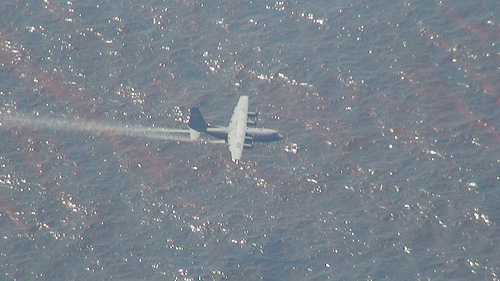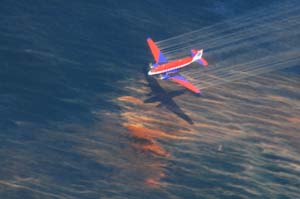Independent scientists have reported that giant plumes of oil are forming beneath the waves in the Gulf of Mexico, with one reported to be 22 miles long, six miles wide and more than a thousand feet deep. But according to BP CEO Tony Hayward, those plumes don’t exist. That’s despite the fact that the company has spread hundreds of thousands of gallons of chemical dispersants in the Gulf, with the sole purpose of keeping the oil under the surface.
Hayward’s own BP colleagues have explained as much. Here’s chief operating officer Doug Suttles talking about dispersants two weeks ago:
Let me start with explaining what these dispersants do … if it works as we have seen in the test, it should mean that there’s much less oil on the surface, which means our total dispersant usage will drop significantly and we should be able to monitor or report on that over the next few days.
And here’s David Horsup, vice-president for research and development at Nalco, the company that manufactures BP’s dispersant of choice, Corexit, explaining how the chemicals work in Nature:
“Aerial observations indicated that the slick on the surface was significantly reduced once you inject the chemical right at the well head,” Horsup says. “You get very rapid dispersion of the oil into the water column.”
This is also the very reason the EPA authorized the use of subsea dispersants, which has never been done previously:
Preliminary testing results indicate that subsurface use of the dispersant is effective at reducing the amount of oil from reaching the surface – and can do so with the use of less dispersant than is needed when the oil does reach the surface.
The reason these chemicals were designed was to keep oil below the surface. Doing so prevents the problems of oil hitting land, where it affects coastal wetlands and wildlife. Keeping it in the water column means fewer media images of oil-soaked pelicans and sea turtles, but creates its own set of problems for fish, shellfish, and the entire Gulf ecosystem. BP’s head apparently wants us to believe that if the oil is out of sight, it should be out of mind.













